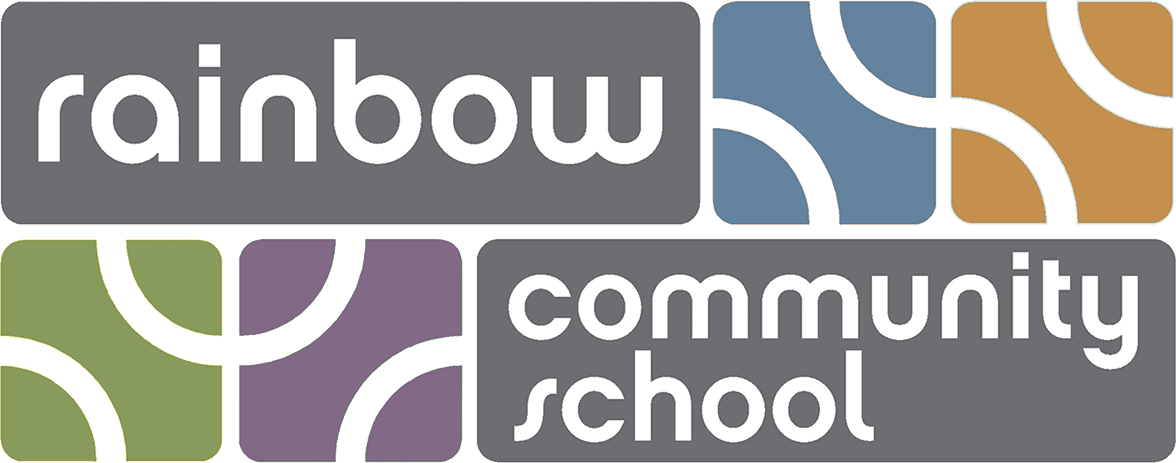Rainbow Seven Domains™
Educating the Whole ChildHolistic Education
Explore the Rainbow Seven Domains™ on this page to glean a greater understanding of our unique educational model.
Integrated Learning
Our educational model allows us to develop the whole child who will become a human who is healthy, intelligent, compassionate, creative, and productive in a changing world.

What is holistic education?
This question sits at the foundation of our goal as an educational institution. To begin to answer it, we must define the term Holism.
Holism is the understanding that life is an interaction of wholes, rather than a collection of individual parts. These whole systems interact in synergy- what affects one system will not only affect the other integrated systems but will also affect the whole.
Holistic principles can be found in health care, psychology, anthropology, ecology, economics, and other disciplines. Holistic Healthcare illustrates this concept well. For example, when evaluating a patient, a holistic doctor will take an integrative approach and consider all parts of the human “system,” including diet, exercise, lifestyle, and stress.
Holistic Education follows this same premise, subscribing to the philosophy that the learning experience is a comprehensive integration not only of traditional academic subjects, but of the many facets that comprise a human being. The reductionist view that humans are simply a mind/body construct- a machine with parts that can be modified in isolation- does not fulfill the learner’s true potential.
Indeed, humans are far more intricate, subtle and mysterious beings. We are multi-faceted creatures with a range of complex emotions, deep connections to the natural world, seekers of the mystery, with an innate need to create, to share, to understand & to be understood. It is the Holistic view that recognizes this concept and the Holistic Education model that seeks its implementation- for the enrichment of the “whole” learner.
Yet, before we can truly nurture the “whole” learner, we must define those individual facets, much in the way that a prism defines white light into seven bands of color. At Rainbow Community School (RCS), the student is viewed Holistically through Seven Domains: spiritual, mental, social, emotional, creative, natural, and physical.
The purpose of this education model is to develop the whole learner into a healthy, intelligent, compassionate, creative, and productive human who is capable of leading an empowered and enriched life.
Instructional Integration
The Rainbow Seven Domains™ is an all-inclusive approach that nurtures the highest growth potential of each child that attends RCS. These domains underlay all teaching and the curriculum.
We use robust tools and strategies for effective instructional integration of this holistic approach. Some of the ways the Rainbow Seven Domains™ are incorporated into our education model are described below.
Teacher Goals and Growth
RCS teachers strive to develop holistically and set personal and professional goals that are holistic in nature. In an effort to support the growth and development of holistic teachers, mentor teachers and administrators observe and evaluate teachers using a Seven Domains Goals Setting and Observation Form.
Personal Domain Reflections
As students become aware of the Rainbow Seven Domains™ and their place within the RCS educational model, they begin to reflect on their own learning styles.
These self-reflections vary in complexity across grades but all indicate the Domains with which the student most resonates and the Domains by which they may be most challenged. They are shared at Student Led Conferences.
Domain Personas
Although we seek to foster a well-rounded individual, many people are naturally inclined towards one or two particular Domains, witnessing and engaging the world through their own unique lens.
The concept of the Domains is versatile and can be used not only for educational purposes, but as understandings of personality archetypes, much akin to Jungian archetypes or Rudolph Steiner’s 4 temperaments.
Each Domain persona perceives and communicates uniquely. Each persona is also presented with innate challenges.
In understanding and respecting these differences, we can gain greater empathy towards others, form a stronger community and manage healthier dialogues. We can, as well, better understand and address the needs of our students.
How are the Rainbow Seven Domains™ Integrated into the RCS Curriculum?
The RCS school day does not follow the traditional schedule of 50 minute class periods. Rather, large instructional blocks that integrate the Rainbow Seven Domains™ are implemented.
While some lessons highlight one domain more than the others, all of the domains are often integrated simultaneously into a lesson. For example, a Math class will primarily focus on the Mental Domain. However, students may be practicing Math facts through kinesthetic learning games which utilize the Physical Domain.
Students may also ponder the deeper meaning of infinite numbers through the lens of the Spiritual Domain, or they may demonstrate how a Math concept, such as the Fibonacci Sequence, is found throughout the Natural Domain, thus making the concept more memorable and relevant.
Students who are skilled in the Social Domain are proactive in asking questions and are adept in working in groups on Math-oriented inquiry projects.
Learners are often drawn to one or two particular domains in which they have a natural proclivity or talent for. When a student is nourished in the particular domain they resonate with, their success often builds confidence and enhances growth in the other domains.
Reciprocally, the holistic approach allows for learners to explore domains that may be challenging, but in a way that utilizes the strengths they have in other domains.
This method is an intimate and nuanced approach, where the teacher will adjust their instruction and the learning environment based upon the individual needs and innate talents of the students.
Students are encouraged to participate in this process, further bolstering the synergy of the unique learner and the interactive, perceptive teacher.
Unit planning guide
Cultivating a holistic learning environment takes intentional planning. Our teachers and/or teaching teams use long term units plans and short term lesson plan frameworks.
These frameworks encourage thinking and planning through the Seven Domains while also inviting cross-curricular integration.
Student Narrative Evaluations / Progress Reports
RCS takes a balanced approach to assessment. Students are assessed using multi-faceted methods to create a well-rounded understanding of both the level of each child and the type of learner each is.
The information that is collected using a robust set of assessments is integrated into student narrative evaluations/ progress reports. These narratives are completed each trimester and are structured in a way that the classroom teacher reports on student growth and development in all Seven Domains.
Domain Days
A Domain Day is an opportunity for students to gather together in groups based upon a specific elected Domain and to spend the entirety of the Day engulfed in the experience of that Domain.
Domain Days give an opportunity for children to be immersed in an educational experience relating to a Domain to which they are innately attracted.
As well, since the ages will be blended, it is an opportunity for students to interact in an educational setting with peers they may not generally mingle with due to the natural age boundaries of each class.


Physical Domain
Expressed through movement, dance, physical education, sports and tactile activities
Domain Profile for Student Learners
Thinks
In movements and through somatic sensations
Loves
Moving, touching, running, jumping, dancing, building, and creating
Learning Needs
Physical games, movement, hands on experiences, and opportunities to build and create


Natural Domain
Expressed through time in nature, caring for the environment, gardening & animal husbandry, observation, inquiry and discovery
Domain Profile for Student Learners
Thinks
Through the senses and through connection with nature
Loves
Moving, touching, running, jumping, dancing, building, and creating
Learning Needs
Physical games, movement, hands on experiences, and opportunities to build create


Social Domain
Expressed through dynamic governance, peer relations, community celebrations, and collaborative learning experiences
Domain Profile for Student Learners
Thinks
Through collaborative communication and
action
Loves
Having friends, talking to people, social events, joining groups, leading and
organizing people
Learning Needs
Social learning
opportunities-partner, small group and/or large group interaction


Emotional Domain
Expressed through reflective exercises, open dialogue, conflict resolution and the arts
Domain Profile for Student Learners
Thinks
With their heart and deeply inside themselves
Loves
Reflecting on and talking about feelings, sympathizing and listening to others
Learning Needs
Ritual and routine, centering, class meetings, and conflict resolution


Creative Domain
Expressed through drawing, painting, dance, music, theater, sculpture, poetry, creative writing, storytelling, fine-art appreciation and play
Domain Profile for Student Learners
Thinks
In images, visuals, rhythms and melodies
Loves
The arts-drawing, designing, sculpting, creating, singing, music, playing an instrument, dancing, acting, role-playing
Learning Needs
Inspiration, time, space and supplies/materials to create


Mental Domain
Expressed through logic, engineering & technology, puzzles & strategy games, experimenting & questioning, reading, writing and research
Domain Profile for Student Learners
Thinks
In words, patterns, through reasoning and problem solving
Loves
Reading, writing, stories, word and number games, logic puzzles, problems to be solved, experiments
Learning Needs
Academically challenging and inquiry based learning opportunities


*Domain profiles adapted from Multiple Intelligences and Learning Styles
Spiritual Domain
Expressed through personal beliefs, myth making, ceremony, religious studies, states of grace & jubilation, the ‘big’ questions and contemplative practices (ie; meditation, yoga, tai chi, blessingways)
Domain Profile for Student Learners
Thinks
Through reflection and contemplation
Loves
Centering, mindfulness, contemplative and reflective practices
Learning Needs
Time alone, quiet, space, and reflection
The Whole Child Book
Rainbow Community School Facutly and Staff published this book based on the Seven Domains model.
It is intended to help others understand more about the holistic model that RCS embraces, how it is implemented and evaluated in the classroom, and why it is so powerful.


